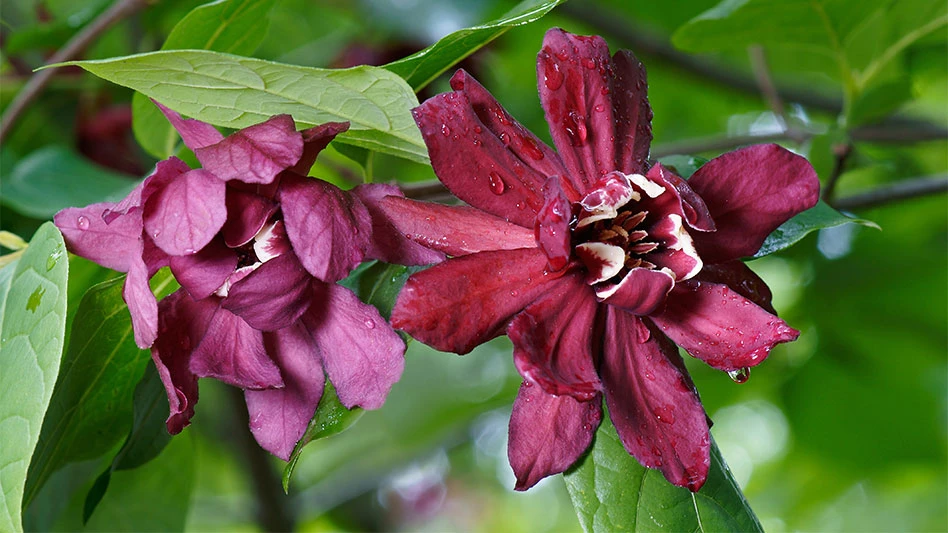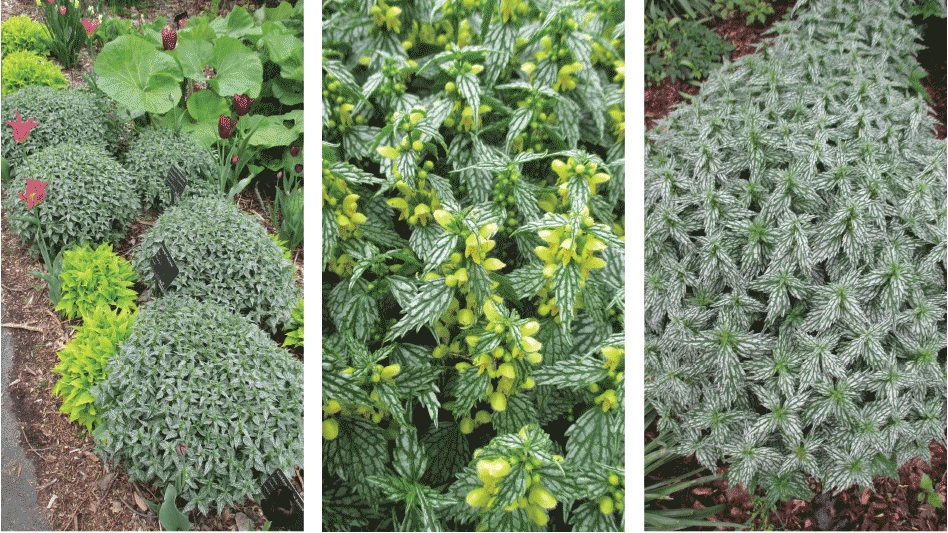 There’s something comfortable and familiar about kicking off your shoes and running barefoot. And it’s that level of solace that encompasses the Stepables plant brand. Stepables founder Fran Hopkins uses that friendly and relaxed attitude to make a personal connection with growers, retailers and consumers. Stepables is a collection of plants that take varying degrees of foot traffic. Consumers are encouraged to feel the plants beneath their feet.
There’s something comfortable and familiar about kicking off your shoes and running barefoot. And it’s that level of solace that encompasses the Stepables plant brand. Stepables founder Fran Hopkins uses that friendly and relaxed attitude to make a personal connection with growers, retailers and consumers. Stepables is a collection of plants that take varying degrees of foot traffic. Consumers are encouraged to feel the plants beneath their feet.
Hopkins created the Stepables brand in 1998 as a regional collection. But two years later she took the program to the national stage. It was a bold move in a market dominated by just a few heavy-hitting plant brands. But she’s worked methodically to build brand awareness and create a program that everyone in the supply chain can understand and support.
“Our goal from the beginning has always been to have Stepables in every garden center in America,” she said. “Right now our brand equity is at an all-time high with consumers. If we are to achieve our goal of reaching all garden centers, we need to open up our program to reach many more consumers.”
To get more plants in front of consumers, Hopkins will partner with more growers and retailers through a revamped Stepables distribution program. What was once a closed program with a network of growers is changing to an open program with no contracts.
“By opening up our distribution network to allow anyone who would like to grow their own Stepables, whether they are wholesale or retail, ordering liners, tags or pots, it can all be done easily and seamlessly to fit into their production schedule,” she said.
.jpg) A broker, which will be announced by early summer, will help bring together liner and finished growers with retailers to help acquire Stepables plants. The brokers will make sure the proper pots, tags and POP are used throughout North America, and will provide sales tools and training to help guide the program.
A broker, which will be announced by early summer, will help bring together liner and finished growers with retailers to help acquire Stepables plants. The brokers will make sure the proper pots, tags and POP are used throughout North America, and will provide sales tools and training to help guide the program.
“This new system will allow us to fill orders, like when a landscaper orders 2,300 plants,” she said. “And with the new distribution system, I can better and more quickly tell a consumer which retailer is selling our products.”
To help boost brand equity even higher, Hopkins designed new tags and POP material. The custom foot-shaped tag, which has been the core of the program, will still be available. But Hopkins has added a new design on a portrait tag, complete with a QR code for every plant. Growers can choose the foot tag, the portrait tag, or both.
Hopkins teamed with new marketing partners to bring the new tags and point of purchase material to the brand. John Henry will exclusively produce all the tags, handles and POP. Summit Plastics will produce all the purple pots and packs.
“By joining all these forces together, we will be able to not only furnish growers and retailers with our branded program for years to come, but push forward in many different arenas to connect even more consumers with our brand,” she said.
Branding lessons
Hopkins has invested a lot of time, effort and money into building the Stepables brand since 1998.
 Stepables’ signage makes it clear how and where consumers can use the plants. Stepables’ signage makes it clear how and where consumers can use the plants. |
“We wanted to be everywhere, and a few marketing gimmicks wasn’t going to do the trick,” she said. “People have no idea how incredibly hard it is to make one person say the word Stepables. You have to be patient and you have to be diligent. And your pockets better be deep enough to handle what you’ve signed up to produce.”
Hopkins also learned that brands don’t take vacations or get weekends off. A brand has to be there for the retailer and the consumer 24 hours a day, 365 days a year.
“A good brand will work for the retailer as a silent salesman and make the sale,” she said. “Likewise, a good brand will work for the consumer to carry through with its brand promise and deliver a good product.”
And Hopkins didn’t stop building the brand during the recession. Instead, she created new product lines and programs.
“We’re feeling pretty good about our future. It does pay to de diligent, never give up and strive for being the best at something,” she said. “We’re certainly not the biggest brand out there, but we might just be the truest to its business model.”
 New tags and POP will boost brand awareness for retailers. New tags and POP will boost brand awareness for retailers. |
Consumer connections
Stepables is supported by an information- and photo-rich website and a lively Facebook page. The Stepables website (www.stepables.com) was designed for consumers (as well as growers, retailers and landscapers) to easily retrieve information, ideas, designs or ask for help. The website is one of Hopkins’ best customer service tools, but Facebook allows her to take things a step further and personally connect with people.
“We have a real following through our Facebook page,” Hopkins said. “I get to connect with consumers primarily to help them solve gardening issues. It’s simply the best PR and R&D a company can do.”
Before the days of social media, Hopkins manned the phones (and she still does), taking calls from consumers and building what she calls friendships—even before people started asking others to be their “friend” on Facebook.
She continues to build a larger fan base with the Stepables Facebook page.
“It’s an instantaneous resource where in one click, I can talk to thousands or even hundreds of thousands of people at one time,” she said. “I’ve never seen a marketing tool as easy as Facebook. Just remember when you’re a company or a brand on Facebook, you have to stop being a corporation and be a person. If you’re just this corporate entity that puts up a photo and three words, you won’t reach anyone.”
 1. Cymbalaria muralis takes light foot traffic. 2. Leptinella x ‘Platt’s Black’ takes moderate foot traffic. 3. Thymus serpyllum ‘Elfin’ takes heavy foot traffic. 1. Cymbalaria muralis takes light foot traffic. 2. Leptinella x ‘Platt’s Black’ takes moderate foot traffic. 3. Thymus serpyllum ‘Elfin’ takes heavy foot traffic. |
Hopkins also uses secret shoppers and her own observations to find out what consumers want.
“Getting out and seeing things for myself in garden centers and people’s yards is the simplest way to research and connect the whole circle,” she said. “If you don’t personally know what a consumer wants or needs and what their concerns are, you can’t make a product that will create that moment when it not only becomes something they pick up and look at, but something they purchase.”
| Plant games Stepables plants are not only in thousands of garden centers nationwide, but now they’ve entered the virtual world. Brand founder Fran Hopkins is marketing her plants through GardenQuest, a new online gardening game from 10-20 media equipped with real-world plants, garden products and sweet graphics. Stepables is the groundcover source for the game. “It was a smart move for us,” Hopkins said. “It’s a good marriage. The game will bring more people to gardening than our industry ever thought. I want to inspire this generation and the next, and be on the cutting edge.” |
For more: www.stepables.com.
Get curated news on YOUR industry.
Enter your email to receive our newsletters.

Explore the April 2012 Issue
Check out more from this issue and find your next story to read.
Latest from Nursery Management
- These companies are utilizing plastic alternatives to reduce horticultural waste
- NewGen Boxwood added to Proven Winners ColorChoice line
- Terra Nova releases new echinacea variety, 'Fringe Festival'
- American Horticultural Society names winners of 2025 AHS Book Awards
- Nufarm announces unified brand
- American Horticultural Society announces winners of 2025 Great American Gardeners Awards
- Shifting the urban environment
- The Growth Industry Episode 3: Across the Pond with Neville Stein






